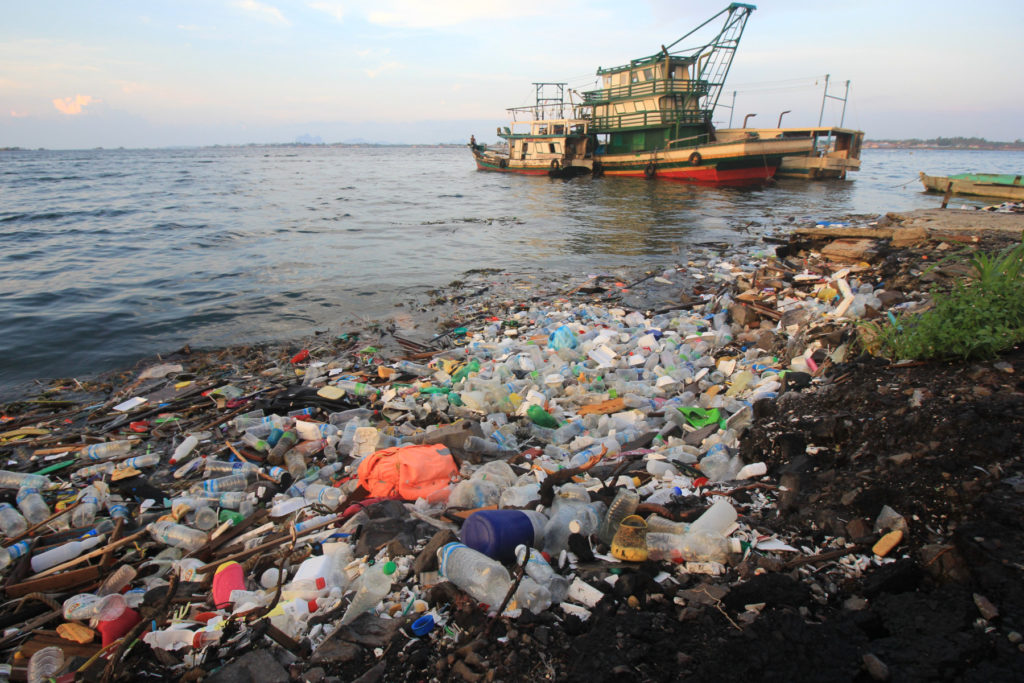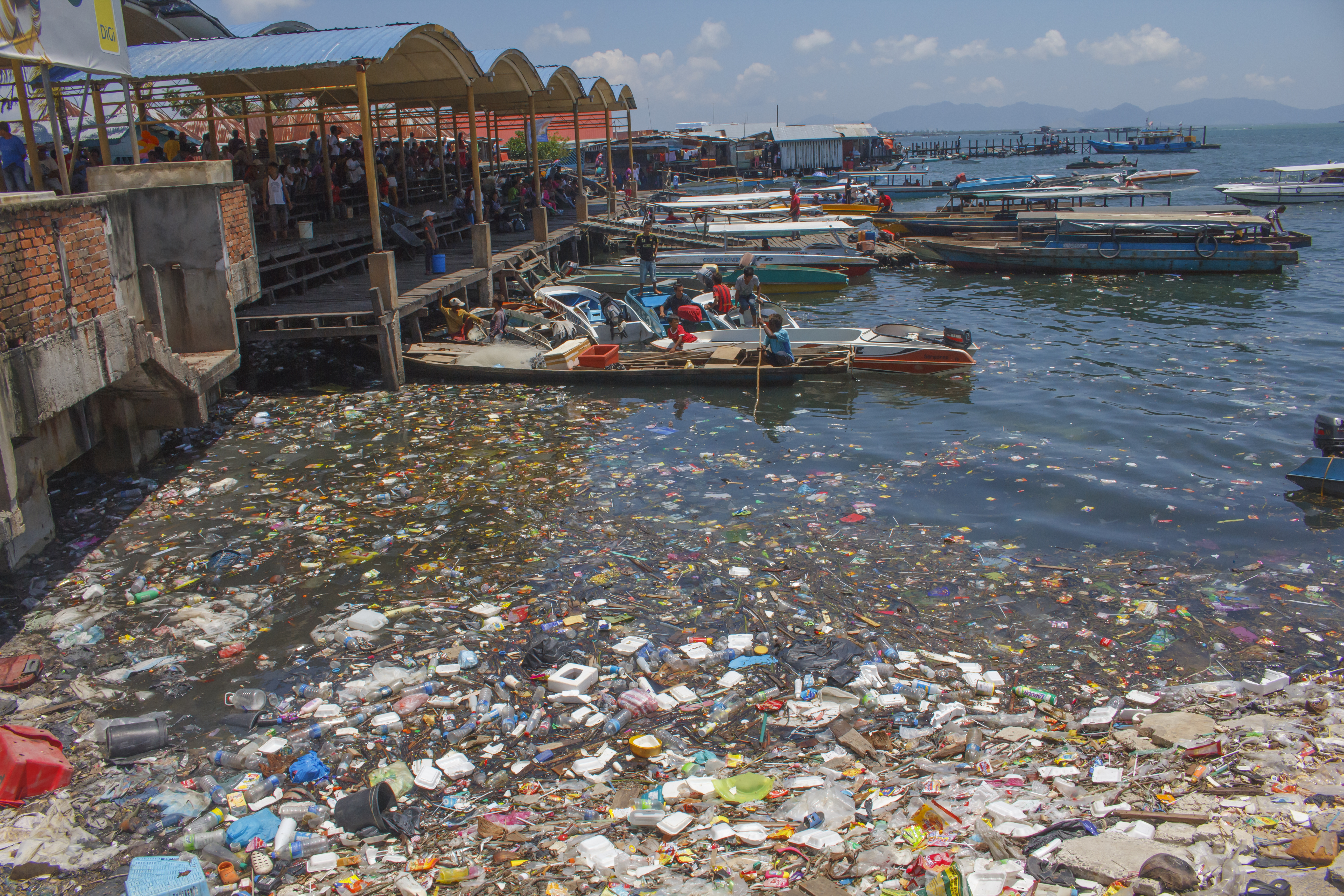One of the biggest threats to our ocean is pollution. Plastics, in particular, are a growing threat to the marine ecosystem. Improperly discarded on land, they eventually find their way into the sea – which impacts aquatic life and the habitats they depend on.
More than 12 million tonnes of plastic waste pollute our ocean each year. The build-up of plastic litter is a testament to everything we use just once in our daily lives, from bottles, cups and packaging, to plastics found in cigarette filters and straws. After heavy rain, many of these items are washed from our streets out to rivers and then the sea, polluting coastal waters and eventually drifting offshore. Here, they break down into ever smaller pieces, eventually becoming microplastics, which can be found everywhere in the world’s ocean.
The harm caused by plastic pollution is wide-ranging. It chokes wildlife above and below the waterline. An estimated one million sea birds and an unknown number of sea turtles die each year as a result of plastic debris obstructing their digestive tracts, and marine animals of all sorts can become tangled and incapacitated by discarded fishing lines and plastic bags. The effects of plastics carrying toxicity throughout the marine food chain is still being researched, with the implications for human health yet to be understood.
Rapid urbanisation along the world’s coastlines has seen the growth of coastal ‘megacities’ (cities with a population of ten million or more). Thirteen of the world’s 20 megacities are situated along coasts. These growing urban populations put pressure on waste management infrastructure. Implementing effective waste reduction initiatives, including comprehensive rules around what can enter the waste stream and what will be recycled, will be key to improving the healthy longevity of our ocean.
Commonwealth action
To create change on the global stage, under the Commonwealth Blue Charter, the United Kingdom and Vanuatu are working together to lead this Action Group on tackling marine plastic pollution – the Commonwealth Clean Ocean Alliance (CCOA).
The Commonwealth is unique in its reach and diversity, but some challenges are shared by all, including environmental challenges. Plastic pollution in our ocean is becoming increasingly evident as a threat to marine ecosystems and therefore ocean-derived livelihoods. Small island states, so often dependent on the ocean and at the forefront of dealing with seaborne challenges, are affected disproportionately.
Plastic pollution is a symptom of modern living – but not all Commonwealth countries are equipped to deal with its negative impacts. The CCOA will work to redress that imbalance, by marshalling the efforts and resources across its membership so that the know-how of those who are already experts in this field can assist the more fragile and isolated members, and that we can learn from each other.
Countries that sign up to join the CCOA are encouraged to commit to one or more of the following ambitions:
- Take steps to eliminate all avoidable single-use plastic waste
- Significant reduction of single-use plastic carrier bags by 2021
- Ban of the sale and manufacture of microbeads in rinse-off cosmetic and personal care products by 2021
These ambitions are supported by a request for CCOA members to sign up to (and implement) the London Protocol, the UN Clean Seas campaign, and the Global Ghost Gear Initiative as means of meeting their commitments under SDG14.
The Alliance urges its member states to take measures on plastics and supports them to encourage more action in their region. Some member states have already taken action on one or more of the above ambitions, and CCOA will seek to draw upon their expertise.
Recognising that the problems of plastic pollution cannot be solved by government actions alone, CCOA will bring together member countries, businesses and non-governmental organisations (NGOs) from across the Commonwealth to commit to action on plastics, share best practices, leverage funding and push for global action.
The amount of plastic humans will produce within the next eight years is equivalent to that generated over the entire 20th century.

There has been an increase in global demand for plastic from around 5 million tonnes in the 1950s, to over 300 million tonnes today

How to join
The relevant Minister should send a letter addressed to the UK Department for Environment, Food and Rural Affairs (Defra) Secretary of State (Rt Hon George Eustice MP) and the Vanuatu Foreign Minister (Hon. Marc Ati), stating that they would formally like to join the Commonwealth Clean Ocean Alliance. If you would like a template letter, please send a request.
- Commonwealth Clean Ocean Alliance Action Plan 2024 (PDF)
- Case study: Developing a National Marine Litter Action Plan, Belize (PDF)
- Case Study: Litter Intelligence Programme, New Zealand (PDF)
- Children’s book: Message in a Bottle (PDF)
- Commonwealth Clean Ocean Alliance - Ministerial Breakfast meeting: Chair Summary (PDF)
- Commonwealth Clean Oceans Alliance (PDF)
- Commonwealth Clean Oceans initiatives and funding (PDF)
